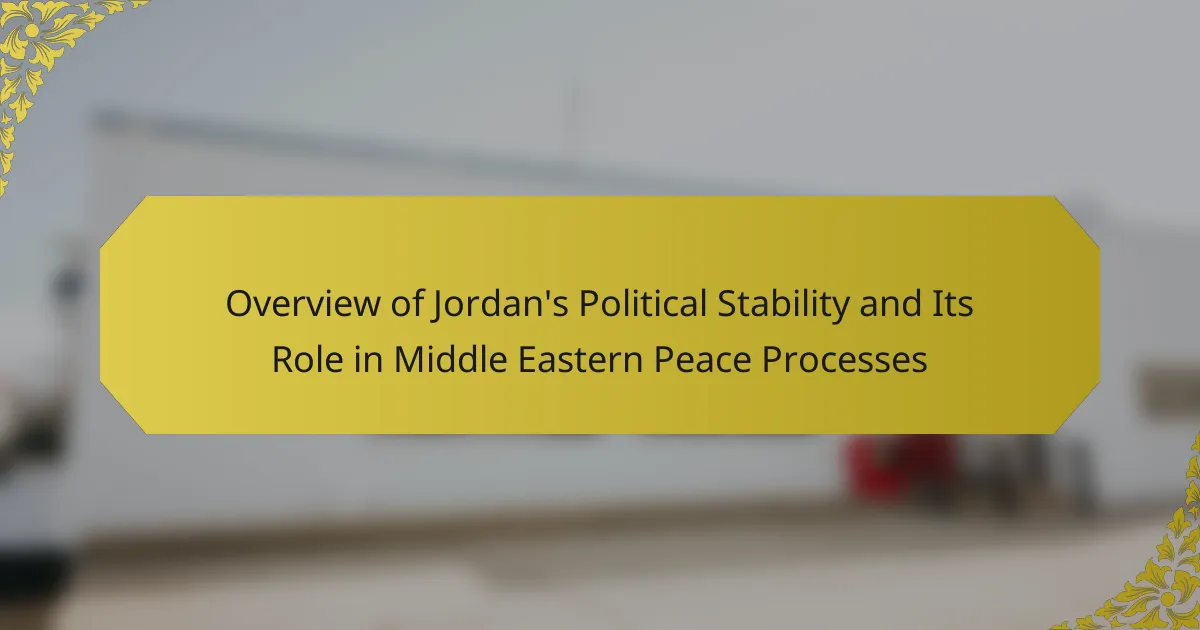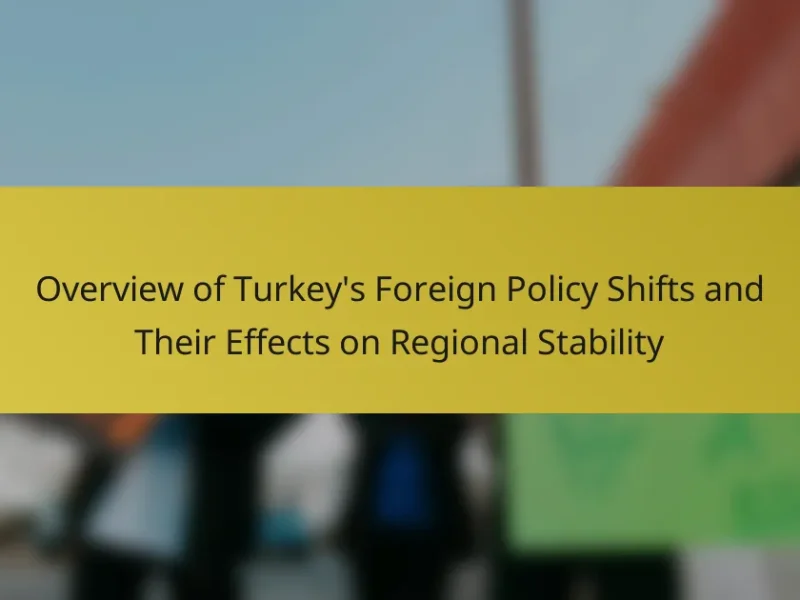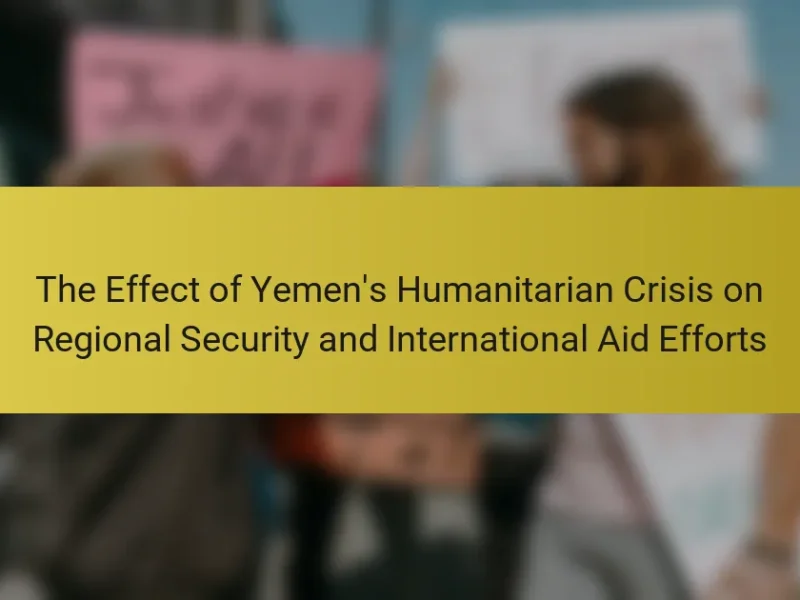
What is the significance of Jordan’s political stability in the Middle East?
Jordan’s political stability is significant in the Middle East as it serves as a crucial buffer against regional conflicts. The country maintains peace with Israel, established through the 1994 peace treaty. This relationship contributes to regional security and facilitates diplomatic dialogue. Jordan plays a vital role in hosting refugees from neighboring conflicts, such as those from Syria and Iraq. This humanitarian stance enhances its reputation as a mediator in peace processes. Additionally, Jordan’s stability encourages foreign investment and economic cooperation in the region. The country collaborates with international partners to combat extremism, further promoting stability. Overall, Jordan’s political stability is essential for maintaining peace and fostering cooperation in the Middle East.
How has Jordan maintained its political stability over the years?
Jordan has maintained its political stability through a combination of effective governance, strategic alliances, and socio-economic policies. The monarchy plays a central role in uniting diverse groups within the country. King Abdullah II has promoted reforms to strengthen political institutions and civil society. Jordan’s strategic location has led to strong ties with Western nations, particularly the United States. Economic assistance and military support from allies have bolstered its stability. Additionally, Jordan has hosted numerous refugees, which has fostered a culture of resilience. The nation’s commitment to peace processes in the region has also contributed to its stability. These factors collectively reinforce Jordan’s position as a stable entity in a volatile region.
What historical factors have contributed to Jordan’s stability?
Jordan’s stability has been influenced by several historical factors. The establishment of the Hashemite monarchy in 1921 provided a strong central leadership. This monarchy has maintained a relatively consistent governance structure, fostering political continuity. Jordan’s strategic location has made it a key player in regional politics. The country has also benefited from foreign aid, especially from the United States, which has helped bolster its economy and military. Additionally, Jordan’s policy of neutrality in regional conflicts has contributed to its stability. The influx of Palestinian refugees has shaped its demographic and political landscape, leading to a unique national identity. Lastly, Jordan’s peace treaty with Israel in 1994 has solidified its role as a mediator in Middle Eastern affairs.
How do Jordan’s governance and political institutions support stability?
Jordan’s governance and political institutions support stability through a constitutional monarchy and a structured political framework. The monarchy provides a unifying figure, King Abdullah II, who plays a crucial role in national cohesion. Jordan’s political system includes a bicameral legislature, which allows for representation and public participation. The government emphasizes security and stability, often prioritizing these aspects in policy-making.
Jordan has established a strong security apparatus to maintain internal order. This includes intelligence services and law enforcement agencies that work to prevent extremism and violence. The country also engages in regional diplomacy, fostering relationships with neighboring states to enhance stability.
Additionally, Jordan’s political institutions promote economic stability through various reforms. Economic policies aim to attract foreign investment and create jobs, thereby reducing social unrest. The country participates in international partnerships that bolster its economic resilience.
These elements collectively contribute to Jordan’s political stability, making it a key player in Middle Eastern peace processes.
What role does Jordan play in regional peace processes?
Jordan plays a crucial role in regional peace processes in the Middle East. The country acts as a mediator in various conflicts, fostering dialogue between opposing parties. Jordan’s strategic location and stable governance enhance its influence in peace negotiations. Historically, Jordan has facilitated discussions related to the Israeli-Palestinian conflict. The 1994 peace treaty with Israel exemplifies Jordan’s commitment to regional stability. Additionally, Jordan hosts numerous international conferences aimed at conflict resolution. The country collaborates closely with the United States and other allies to promote peace initiatives. Jordan’s involvement is essential for maintaining security and cooperation in the region.
How does Jordan’s political stability influence its diplomatic relations?
Jordan’s political stability significantly enhances its diplomatic relations. A stable political environment fosters trust and credibility with other nations. This stability allows Jordan to play a mediating role in regional conflicts. For instance, Jordan’s government has facilitated peace talks between Israel and Palestine. Additionally, Jordan maintains strong ties with Western countries, particularly the United States. These relationships are bolstered by Jordan’s consistent internal stability. Furthermore, political stability attracts foreign investment, which strengthens economic partnerships. Overall, Jordan’s stability is a critical asset in navigating complex diplomatic landscapes.
What peace initiatives has Jordan been involved in historically?
Jordan has historically been involved in several significant peace initiatives. One of the most notable is the Jordan-Israel Peace Treaty signed in 1994. This treaty marked the end of a state of war between the two nations and established diplomatic relations. Jordan has also played a key role in the Arab Peace Initiative of 2002. This initiative aimed to normalize relations between Arab countries and Israel in exchange for the establishment of a Palestinian state. Additionally, Jordan has facilitated various dialogues between Palestinian factions and Israel. The nation has hosted numerous peace talks, including those related to the Israeli-Palestinian conflict. Jordan’s strategic location and stable governance have made it a vital player in Middle Eastern diplomacy.

What challenges does Jordan face that could impact its political stability?
Jordan faces several challenges that could impact its political stability. Economic difficulties, including high unemployment and public debt, strain government resources. The influx of refugees from Syria has increased social tensions and pressure on services. Political reforms have been slow, leading to public discontent. Additionally, regional instability, particularly from neighboring conflicts, poses security threats. The reliance on foreign aid for economic support creates vulnerabilities. These factors collectively challenge Jordan’s ability to maintain stability and governance.
How do economic factors affect Jordan’s political landscape?
Economic factors significantly influence Jordan’s political landscape. High unemployment rates, particularly among youth, create social unrest. Economic challenges, such as inflation and limited job opportunities, can lead to public protests. These protests often pressure the government to implement reforms. Additionally, Jordan’s reliance on foreign aid affects its political decisions. Economic stability is crucial for maintaining internal security and regional alliances. The International Monetary Fund (IMF) has provided loans to Jordan, impacting its fiscal policies. Jordan’s economic conditions can also affect its diplomatic relations with neighboring countries.
What is the impact of unemployment and inflation on political stability?
Unemployment and inflation significantly undermine political stability. High unemployment rates can lead to social unrest and dissatisfaction with government policies. Inflation erodes purchasing power, causing economic hardship for citizens. Both factors increase public discontent and can destabilize governments. For instance, the Arab Spring was partly fueled by high unemployment and rising prices in several Middle Eastern countries. Historical data shows that economic distress often correlates with increased protests and calls for political change. In Jordan, rising inflation and unemployment have prompted public demonstrations, reflecting citizens’ frustrations. Thus, the interplay of unemployment and inflation is critical in assessing political stability.
How does Jordan’s reliance on foreign aid influence its governance?
Jordan’s reliance on foreign aid significantly influences its governance structure. The country receives substantial financial support from international donors, which shapes its policy decisions. This aid often comes with conditions that promote certain governance reforms. For example, the United States and European Union provide funding that encourages democratic processes and economic development. However, dependency on foreign aid can also limit Jordan’s sovereignty in decision-making. The government may prioritize donor interests over local needs to maintain this financial support. In 2021, foreign aid constituted approximately 10% of Jordan’s GDP, underscoring its importance in governance. This reliance can lead to instability if aid levels fluctuate or political conditions change. Overall, foreign aid plays a crucial role in shaping Jordan’s governance landscape, balancing between domestic priorities and external expectations.
What social factors contribute to Jordan’s political environment?
Social factors that contribute to Jordan’s political environment include demographic diversity, tribal affiliations, and economic conditions. Jordan has a significant population of Palestinian refugees, which influences national identity and political dynamics. Tribal affiliations play a crucial role in governance and loyalty, shaping political alliances. Economic challenges, including high unemployment and inflation, create social unrest and impact political stability. Additionally, the youth population’s demand for reforms affects political discourse. These factors collectively shape Jordan’s political landscape and influence its stability in the region.
How do demographic changes affect political stability in Jordan?
Demographic changes significantly affect political stability in Jordan. The influx of refugees, particularly from Syria, has altered the population balance. This has led to increased competition for resources such as jobs and housing. The youth population is also growing, which heightens expectations for employment and political participation. Disparities among different ethnic and religious groups can exacerbate tensions. Historical grievances among these groups can resurface due to demographic shifts. As a result, the government faces challenges in maintaining social cohesion. Political stability is further threatened by the need for reforms to address these demographic pressures.
What role does public opinion play in Jordan’s political decisions?
Public opinion significantly influences Jordan’s political decisions. The Jordanian government often considers public sentiment to maintain stability and legitimacy. Citizens express their views through protests, social media, and elections. For instance, during the Arab Spring, public dissatisfaction led to protests demanding reforms. The monarchy responded by implementing limited changes to appease the populace. Additionally, public opinion can shape policies on economic issues and foreign relations. The government monitors social media trends to gauge public sentiment. This responsiveness helps prevent unrest and fosters a sense of inclusion among citizens. Overall, public opinion serves as a crucial factor in Jordan’s political landscape.

How does Jordan’s political stability contribute to broader Middle Eastern peace efforts?
Jordan’s political stability plays a crucial role in broader Middle Eastern peace efforts. A stable Jordan acts as a buffer against regional conflicts. It fosters diplomatic relations between Israel and Palestine. Jordan’s peace treaty with Israel in 1994 exemplifies its commitment to regional security. The country hosts numerous peace talks and dialogues among conflicting parties. Jordan also provides humanitarian support to refugees from neighboring conflicts. Its stability allows for cooperation with Western nations on security issues. This cooperation enhances regional stability and counterterrorism efforts. Overall, Jordan’s political stability is integral to fostering a peaceful Middle East.
What partnerships does Jordan have with other countries in peace processes?
Jordan has established partnerships with several countries in peace processes. Notably, Jordan collaborates with the United States in various diplomatic initiatives. This partnership aims to promote stability in the region. Jordan also engages with Egypt and Saudi Arabia in efforts to mediate conflicts. The country plays a key role in the Israeli-Palestinian peace process. Jordan’s historical ties to Palestine enhance its influence in negotiations. Additionally, Jordan has hosted multiple international conferences focused on peace and security. These collaborations underscore Jordan’s strategic position in Middle Eastern diplomacy.
How does Jordan facilitate dialogue between conflicting parties?
Jordan facilitates dialogue between conflicting parties through diplomatic initiatives and strategic mediation. The country hosts peace talks and negotiations, leveraging its stable political environment. Jordan’s geographic location makes it a neutral ground for discussions among various factions. The government often collaborates with international organizations to promote dialogue. Jordan’s monarchy plays a significant role in these efforts, using its influence to bring parties together. Historical context shows Jordan’s involvement in regional peace processes, such as the Israeli-Palestinian conflict. The country maintains strong relationships with both Western and Arab nations, which aids in facilitating discussions. Jordan’s commitment to peace is evident through its active participation in multilateral forums.
What unique position does Jordan hold as a mediator in the region?
Jordan occupies a unique position as a mediator in the Middle East due to its geopolitical location and historical ties. It shares borders with Israel, Palestine, Syria, and Iraq, making it a central player in regional diplomacy. Jordan has maintained peace treaties with Israel since 1994, fostering trust and communication. The country also hosts a significant number of Palestinian refugees, which enhances its credibility in Palestinian affairs. Additionally, Jordan’s monarchy is viewed as a stabilizing force in a volatile region. The nation has been involved in various peace initiatives, such as the Arab Peace Initiative. Its role is further supported by its strategic alliances with Western powers, particularly the United States. These factors collectively enable Jordan to facilitate dialogue among conflicting parties in the region.
What best practices can be learned from Jordan’s approach to political stability?
Jordan’s approach to political stability emphasizes inclusive governance and regional diplomacy. The country maintains a delicate balance between various ethnic and religious groups. This fosters social cohesion and reduces conflict. Jordan’s monarchy plays a crucial role in uniting diverse interests. The government promotes economic development to alleviate poverty and unemployment. These efforts contribute to a stable political environment. Jordan also engages in proactive diplomacy, collaborating with neighboring countries. This enhances its role in regional peace processes. Historical context shows that Jordan’s stability has been vital during regional crises, such as the Syrian refugee influx.
How can other nations apply Jordan’s strategies to enhance their own stability?
Other nations can apply Jordan’s strategies by focusing on inclusive governance. Jordan emphasizes dialogue among diverse political groups. This approach fosters trust and cooperation. Nations can also prioritize economic stability through strategic partnerships. Jordan’s economic policies promote regional trade and investment. Furthermore, addressing social issues is crucial. Jordan invests in education and healthcare to improve societal well-being. Countries can learn from Jordan’s proactive security measures. Jordan collaborates with international partners to combat extremism. These strategies have contributed to Jordan’s relative stability in a volatile region.
What lessons does Jordan’s experience offer for future peace processes?
Jordan’s experience offers several lessons for future peace processes. First, the importance of inclusive dialogue is evident. Jordan has engaged various stakeholders in its peace efforts, fostering broader acceptance. Second, maintaining regional stability is crucial. Jordan’s strategic location and relationships have helped it mediate conflicts. Third, economic cooperation can enhance peace. Jordan has pursued economic partnerships to strengthen ties with neighboring countries. Fourth, addressing humanitarian concerns is vital. Jordan has hosted refugees, showing that compassion can build goodwill. Finally, the role of international support cannot be underestimated. Jordan has benefited from external aid, which has bolstered its peace initiatives. These lessons highlight the significance of collaboration, stability, and support in successful peace processes.
Jordan’s political stability is a critical factor in the Middle East, serving as a buffer against regional conflicts and facilitating diplomatic relations, particularly with Israel. The country has maintained its stability through effective governance, strategic alliances, and socio-economic policies, while also playing a key role in hosting refugees and promoting peace initiatives. Historical factors, including its monarchy and foreign aid, contribute to this stability, which is essential for Jordan’s involvement in regional peace processes. Additionally, challenges such as economic difficulties and demographic changes pose risks to its stability, influencing both governance and public sentiment. Overall, Jordan’s unique position enhances its role as a mediator in Middle Eastern diplomacy.


